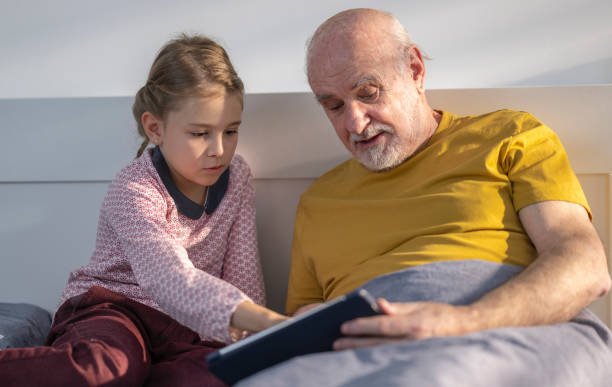Grandparents often carry the legacy of a family’s past. Their stories, passed down orally, are more than just personal memories. They are lessons wrapped in narrative form about love, resilience, patience, and character. These aren’t found in digital feeds or classroom lectures. They are intimate, unique, and emotionally resonant. Books like grandpa’s children’s stories Charles Neal beautifully capture this essence by blending old-fashioned storytelling with modern accessibility. They prove that these tales, whether told at bedtime or written down for generations, remain powerful tools for teaching and connecting.
Difference Between Stories and Content
It’s important to understand what sets Grandpa’s stories apart from modern digital content. Most digital media is optimized for speed and consumption. Social platforms thrive on short-form videos, memes, and trending posts that are often forgotten as quickly as they are viewed. Grandpa’s stories, however, are built on reflection. They are slow, deliberate, and deeply personal. They invite the listener to pause, reflect, and engage on a human level something digital platforms rarely offer.
Building Bonds Across Generations
One of the most powerful impacts of grandparent storytelling is the way it brings generations together. In many families, technology has widened the gap between children and elders. While kids spend time gaming or watching YouTube, their grandparents may feel left out of this digital age. But when Grandpa tells a story about his youth or a valuable lesson he learned, the generational gap narrows. Children become more empathetic, curious, and emotionally connected. These moments help build respect and mutual understanding elements often lost in our fast-paced lives.
Teaching Through Experience
Grandparents don’t just tell stories they teach through them. Each tale contains valuable life lessons often rooted in real experiences. A story about surviving hardship can teach resilience. A memory about a mistake might reveal the importance of honesty or responsibility. These are not just morals for entertainment’s sake they are grounded in lived truth. Unlike lessons from media or school, these teachings are trusted and remembered because they come from someone the child loves and admires.
Finding Identity Through Family Stories
In a world where identity is often shaped by influencers, celebrities, or online trends, family stories provide a much-needed sense of personal grounding. Listening to Grandpa’s tales helps children learn where they come from who their family was, what they valued, and how they lived. These stories serve as cultural and personal blueprints, offering a sense of pride and belonging that no trending hashtag can provide. They remind children that they are part of a larger, meaningful story.
Emotional Healing and Connection
Storytelling has emotional benefits for both grandparents and grandchildren. For children, it’s an act of listening and learning. For grandparents, it’s a way to feel seen, heard, and valued. Sharing their life stories gives elders a renewed sense of purpose. It validates their experiences and helps them connect with younger family members in a meaningful way. This emotional exchange promotes mental well-being and can ease feelings of isolation, especially for older adults.
Preserving Stories Through Technology
Though it may seem ironic, the digital age doesn’t have to replace traditional storytelling it can help preserve it. Families can use audio and video recording tools to document Grandpa’s stories. These recordings become cherished keepsakes for future generations. Podcasts, family YouTube channels, and digital journals are excellent ways to turn spoken stories into lifelong memories. The key is to use technology as a tool, not a replacement, for real human connection.
Making It a Family Tradition
Storytelling can easily become a family ritual. Weekly story nights, interviews with grandparents, or memory-sharing sessions during holidays can help build bonds and preserve valuable history. Children can be encouraged to write down what they learn or even retell the stories to others, strengthening memory and reinforcing values. Involving the whole family in this tradition ensures that these stories will continue to inspire, teach, and connect across generations.
Personal History as a Learning Tool
Grandpa’s stories often touch on historical events from a personal perspective. These aren’t dry facts from textbooks they’re first-hand accounts of how real people lived through significant events. Whether it’s the Great Depression, wartime, or moments of social change, these stories offer emotional context that makes history come alive. Children who hear these accounts often develop a deeper interest in the past and a stronger appreciation for the sacrifices made by previous generations.
Lasting Legacy
For many grandparents, storytelling is a way to leave something behind a legacy that outlives them. Their voice, experiences, and values become part of the family’s moral compass. And for children, these stories become a source of strength, especially when facing challenges. A tale of how Grandpa overcame adversity can inspire courage in difficult moments. These stories don’t just entertain they shape character and foster resilience.
Conclusion
In conclusion, Grandpa’s stories are more important today than ever. In a world overwhelmed by digital noise, these narratives cut through with clarity and warmth. They teach, heal, connect, and inspire in ways that no screen ever could. By listening, recording, and passing them on, we ensure that these stories and the wisdom within them continue to live and guide future generations.
The next time Grandpa begins with “When I was your age…,” don’t look at your phone. Look at him. Listen. Because in that story lies a treasure no algorithm can ever replace.
